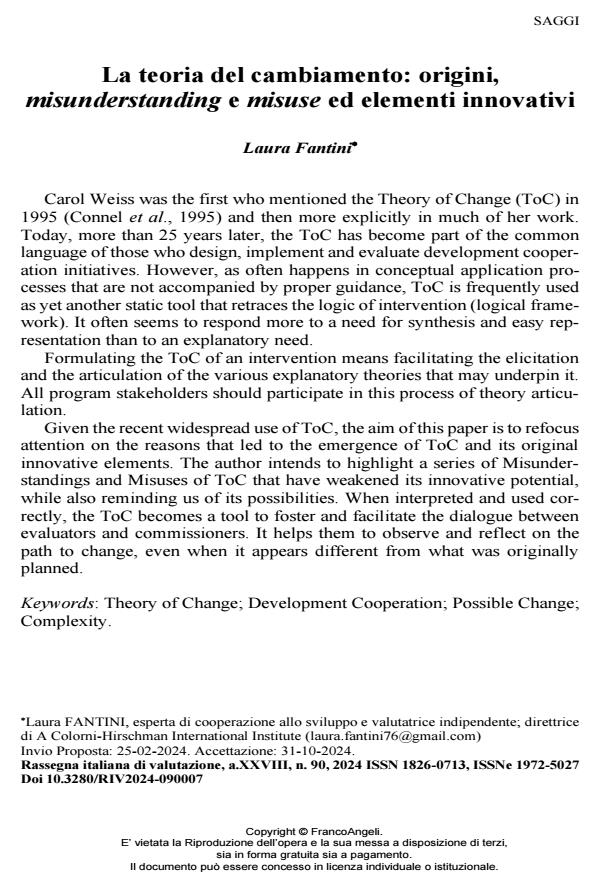La teoria del cambiamento: origini, misunderstanding e misuse ed elementi innovativi
Titolo Rivista RIV Rassegna Italiana di Valutazione
Autori/Curatori Laura Fantini
Anno di pubblicazione 2024 Fascicolo 2024/90
Lingua Italiano Numero pagine 15 P. 96-110 Dimensione file 418 KB
DOI 10.3280/RIV2024-090007
Il DOI è il codice a barre della proprietà intellettuale: per saperne di più
clicca qui
Qui sotto puoi vedere in anteprima la prima pagina di questo articolo.
Se questo articolo ti interessa, lo puoi acquistare (e scaricare in formato pdf) seguendo le facili indicazioni per acquistare il download credit. Acquista Download Credits per scaricare questo Articolo in formato PDF

FrancoAngeli è membro della Publishers International Linking Association, Inc (PILA), associazione indipendente e non profit per facilitare (attraverso i servizi tecnologici implementati da CrossRef.org) l’accesso degli studiosi ai contenuti digitali nelle pubblicazioni professionali e scientifiche.
Carol Weiss was the first who mentioned the Theory of Change (ToC) in 1995 (Connel et al., 1995) and then more explicitly in much of her work. Today, more than 25 years later, the ToC has become part of the common language of those who design, implement and evaluate development cooperation initiatives. However, as often happens in conceptual application processes that are not accompanied by proper guidance, ToC is frequently used as yet another static tool that retraces the logic of intervention (logical framework). It often seems to respond more to a need for synthesis and easy representation than to an explanatory need. Formulating the ToC of an intervention means facilitating the elicitation and the articulation of the various explanatory theories that may underpin it. All program stakeholders should participate in this process of theory articulation. Given the recent widespread use of ToC, the aim of this paper is to refocus attention on the reasons that led to the emergence of ToC and its original innovative elements. The author intends to highlight a series of Misunderstandings and Misuses of ToC that have weakened its innovative potential, while also reminding us of its possibilities. When interpreted and used correctly, the ToC becomes a tool to foster and facilitate the dialogue between evaluators and commissioners. It helps them to observe and reflect on the path to change, even when it appears different from what was originally planned.
Parole chiave:Theory of Change; Development Cooperation; Possible Change; Complexity.
Laura Fantini, La teoria del cambiamento: origini, misunderstanding e misuse ed elementi innovativi in "RIV Rassegna Italiana di Valutazione" 90/2024, pp 96-110, DOI: 10.3280/RIV2024-090007